
Harvest 2022 is coming to a close. The dry spells have played a key part in farmers wrapping up the harvest in a timely fashion. Harvest reports are generally satisfactory with some excellent yields of cereals, rape and pulses. Aim to get all field maintenance jobs (hedge cutting, levelling, drainage etc.) in the field done now before the busy sowing period kicks in. Cutting hedges is now permissible and should be carried out as soon as possible. Where compaction was an issue, sub-soiling should be considered. Straw should be incorporated at this stage where fields were chopped. Where brome was an issue, it is vitally important to get some light cultivations underway to encourage seeds to germinate. Allow minimum of 3 weeks before burning off. Focus on headlands especially, as this is where brome first becomes an issue. Acting now before it is too late can help to reduce the likelihood of herbicide resistance down the line, and is a key component of Integrated Pest Management.
Oilseed Rape
There is still time to get OSR into the ground before it is too late. Switching to a more vigorous variety with rapid autumn development such as PT303 or DK ExStar is key when sowing into September. These are varieties with excellent resistance to lodging and high stem stiffness. Keep the seeding rate high when sowing later, aim for about 50 seeds/m2. Ensure to consider the thousand grain weight of the seed when calibrating the drill.
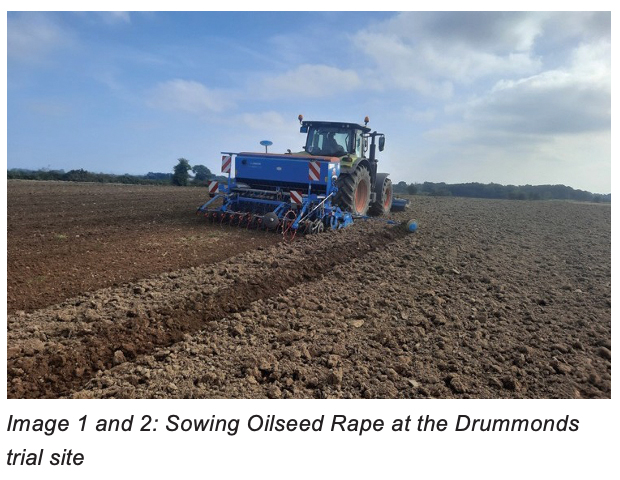 |
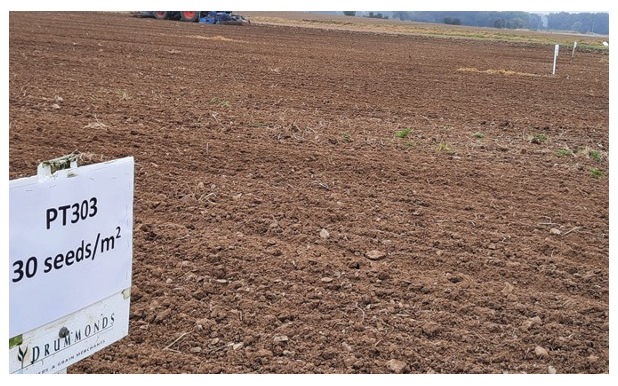 |
When sowing OSR, it is important to get the basics correct: ensure pH is above 6.5, sow into a fine firm seed bed with good seed-soil contact. To ensure an optimal establishment, incorporate the appropriate fertiliser to the seedbed based on up-to-date soil indices. Be on the lookout for slugs, flea beetle and pigeons grazing your crops. Shot- holes in the leaves are a result of slug damage. Slug pellets may be necessary.
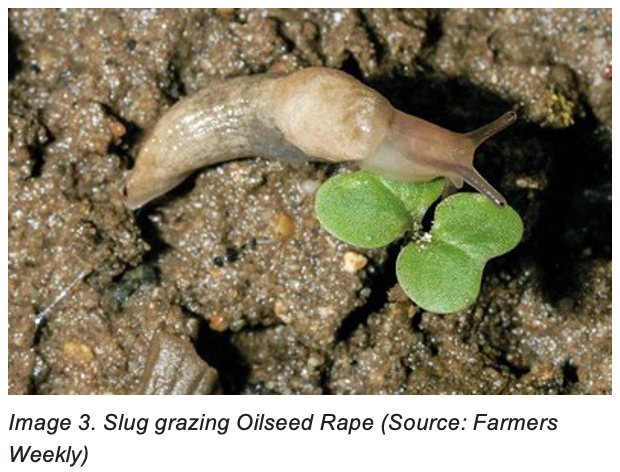 |
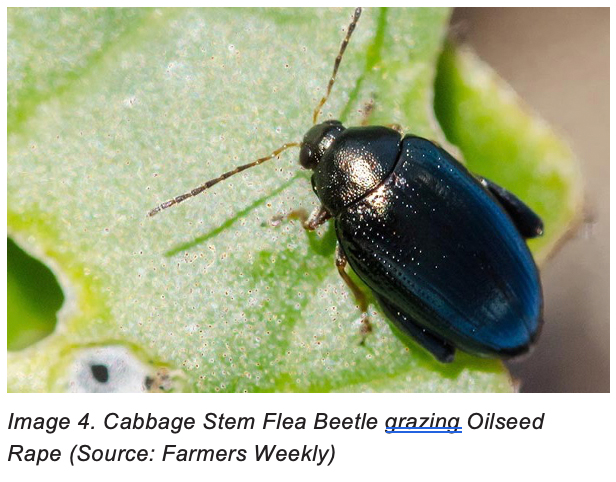 |
Winter Cereal Varieties for 2022/23
Now is the time to start thinking about which winter cereal varieties you are going to choose. Drummonds offer a range of the highest performing varieties which are trialled and tested in our variety evaluation programme.
Winter Wheat Varieties
| Torp | Spearhead |
|
Torp performed extremely well in the 2021/2022 growing season, with many growers reporting yields upwards of 5t/acre. Choosing Torp this year offers the grower many benefits:
|
Spearhead was provisionally recommended on the Department of Agricultures Recommended List for 2022 for all the right reasons.
|
Winter Barley Varieties
Bordeaux
Bordeaux is a 2-row winter barley with 6 row yields. Bordeaux has a superb specific weight and low screenings, an important consideration for the feed market. It also boasts early maturity and stiff straw.
- A very high yielding 2 row winter barley
- One of the best winter barley varieties against lodging
- Excellent resistance to powdery mildew and brown rust
- High grain quality
Winter Oat Varieties
Husky
Husky will be the majority of winter oat seed planted for the 2022/2023 growing season. There are a number of reasons for this:
- Winter hardiness
- High yield potential
- Excellent stander
- Top Agronomic package
- Good grain quality
A number of other varieties will also be available through Drummonds, please contact your local sales representative for other enquiries.
Lime
Delivering and spreading lime at affordable prices across all our branches. The benefit of liming Irish soil is well known and was one of the earliest soil management practices that farmers adopted to improve the productivity of soils. It is no different today, as managing soils to keep them in the optimum soil pH, through regular soil testing offers many benefits. Only 12% of Irish soils are at an optimal level for soil pH, P & K. The benefits of lime are;
- Increased production
- Release up to 80kg/N/ha/year
- Unlock soil phosphorous (P) and potassium (K)
- Increase the response to freshly applied N, P & K
- Liming gives a 7:1 return on investment
As you can see from the diagram below, the top 6 nutrients required for plant growth are most available in the pH range from 6.0-7.5.
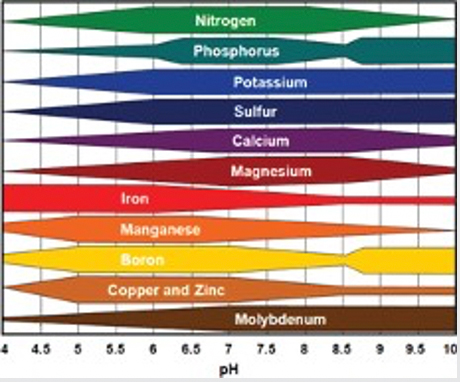 |
Which lime to use?
The most common ground lime used in Ireland is calcium lime, however the importance of a broad spectrum soil test is critical on choosing which lime to use. Drummonds provide a concise accurate soil test carried out by your local advisor, giving back useful and practical advice on how to correct your soil analysis. A desired calcium : magnesium ratio of 10:1 is required for optimal grass growth and up to 14:1 in tillage soils. Use magnesium lime where magnesium deficiencies need correcting.
In soils where there are high levels of magnesium, use calcium limestone to balance to the desired ratio. Applying calcium limestone will increase calcium and reduce magnesium. Even if the pH looks OK you can still apply calcium lime in this situation. This opens up the soil allowing it to breathe, soil biology to flourish and water to drain down through the soil profile more easily
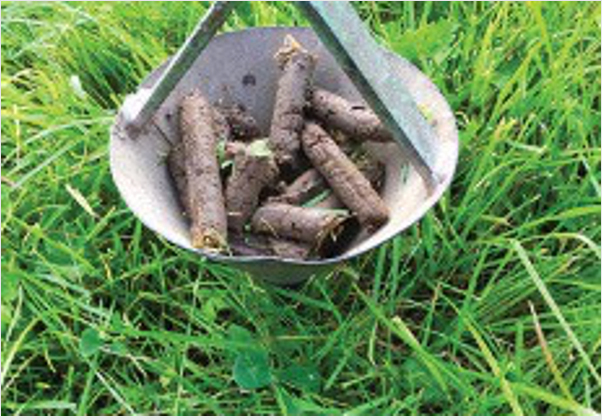 |
Lime facts
Lime needs to be applied on a regular basis as it is continuously leached from the soil, mainly through drainage water. The use of N fertilisers and the removal of crops and livestock also remove lime from the soil.
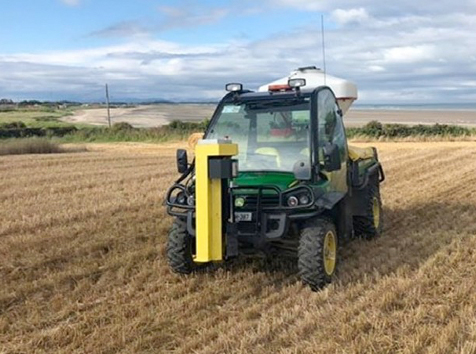 Drummonds have always provided a top quality soil testing service and practical advice, which can be carried out by your local branch / advisor. Drummonds are now taking soil analysis to the next level where we will provide a full soil test analysis as well as providing Drummond’s Ground Lime delivery and Spreading at affordable prices. Both methods of soil sampling can be carried out. Whether it be a standard W- Shaped test or a full field mapping service consisting of variable pH, P and K levels. Current regulations require one soil sample per 5 hectares and are valid for 4 years. Aim to test 20% of your farm annually.
Drummonds have always provided a top quality soil testing service and practical advice, which can be carried out by your local branch / advisor. Drummonds are now taking soil analysis to the next level where we will provide a full soil test analysis as well as providing Drummond’s Ground Lime delivery and Spreading at affordable prices. Both methods of soil sampling can be carried out. Whether it be a standard W- Shaped test or a full field mapping service consisting of variable pH, P and K levels. Current regulations require one soil sample per 5 hectares and are valid for 4 years. Aim to test 20% of your farm annually.
Your local branch will organize a representative to carry out a soil test for analysis. We provide both standard and broad spectrum analysis and liaise with the farmer providing professional advice on how to correct your soil result.
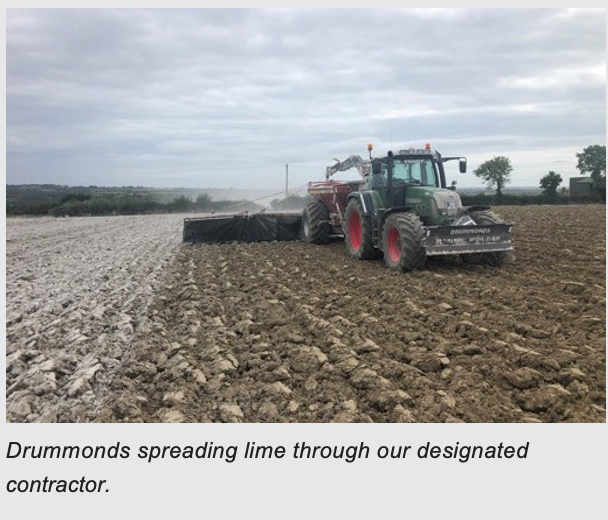 |
Drummonds also offers a lime and variable rate lime spreading service through our branch network. We will organize ground lime deliveries and an accurate spreading service provided by our local contractor.
For further information Speak to your local Drummonds Agronomist.

